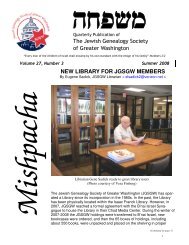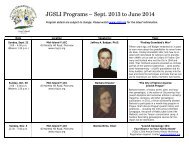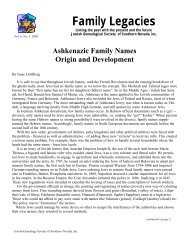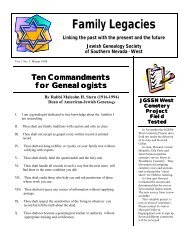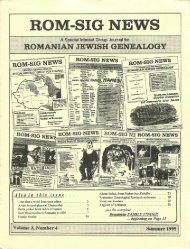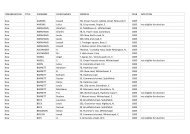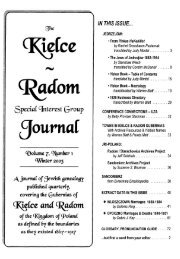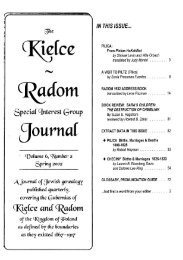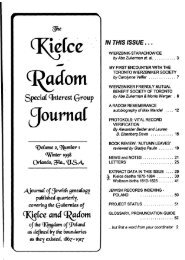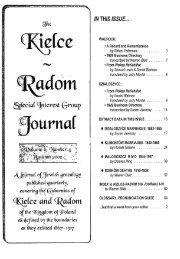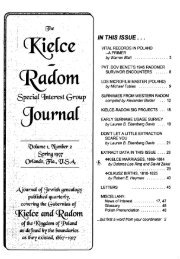THE MEMORIAL BOOK OF PÁPA JEWRY - JewishGen
THE MEMORIAL BOOK OF PÁPA JEWRY - JewishGen
THE MEMORIAL BOOK OF PÁPA JEWRY - JewishGen
You also want an ePaper? Increase the reach of your titles
YUMPU automatically turns print PDFs into web optimized ePapers that Google loves.
At about the same time I was invited by Elazar Bass (Laci) – may he rest in peace – to a<br />
meeting for youth of my age. He said that somebody had come from Szombathely and wanted to<br />
talk to us. We went to the meeting wearing pressed Charleston pants and ties, as it behooved<br />
young gentlemen from good homes. To our great surprise, the guest was a handsome blond<br />
young man with blue eyes, only 2 or 3 years older than we, wearing the Scouts' uniform! A<br />
Jewish scout? It made a great impression on us. (We had no chance to be accepted by the Scouts)<br />
We had not seen such a thing before and what he said was also brand new for us. He talked about<br />
the life of Jewish Scouts in Szombathely, about their social life, meetings, talks, games, lectures,<br />
trips and summer camps! He talked about Palestine, the land of our fathers, about the chalutzim<br />
who immigrate to Israel in order to redeem the land, about the swamps, about malaria, about<br />
farmers and Jewish villages. His words were absorbed into our souls yearning for the idea of<br />
redemption, with youthful enthusiasm.<br />
And it was only the beginning. Most of us came from orthodox families and we stayed<br />
observant for a long time. The following story is a good example to illustrate the beginnings.<br />
Once we had a meeting to talk with a shaliach from the leadership in Budapest . When it was the<br />
time to pray Minchah, we asked the shaliach to stop talking so that we could pray in minyan. He<br />
concealed his surprise but of course fulfilled our request. One of us – Dénes Zommer, of blessed<br />
memory – not only did not know how to pray, but was talking and laughing and wanted to make<br />
us laugh in the middle of the shmone-esreh. The rascal put us to shame in the company of the<br />
shaliach, and after the prayer we said we were sorry and asked the shaliach to forgive him for his<br />
behaviour. It was not his fault, his secular parents had not taught him to pray, but we would<br />
"educate him".<br />
There is another story about our ardent Hungarian patriotism, while being orthodox.<br />
Shortly before the ken initiation and our solemn admission into the national movement of<br />
hashomer hatzair,we received a circular from the top leadership together with the 10<br />
commandments of the movement.<br />
The draft of the commandments coincided exactly with the Hungarian scouts ' 10<br />
commandments, with the exception of the third one, which said: "Hashomer is loyal to his<br />
country, language and homeland, to Eretz Yisrael." We organized a series of talks about each<br />
commandment – only he who belonged to the shomers knows what it was like. Eventually we<br />
came to a decision, which was drafted together with an explanation for our decision, included in a<br />
long letter and sent to the top leadership: "We have discussed the 10 commandments seriously<br />
and we accept everything in them according to the letter and the spirit, with the exception of the<br />
third commandment. Since our country is Hungary, our language is Hungarian, and our homeland<br />
is Magyarország forever."<br />
This is how it was in the beginning. It was an unforgettable experience for us when the<br />
first agricultural hachshara reached our town. "hachalutzim" materialized. Until then we had<br />
only heard stories about them and pictured them to ourselves with the help of our imagination.<br />
They were young people the age of our elder brothers and sisters, most of them had already<br />
passed the matriculation exam. Instead of going to university to study medicine or law (the<br />
accepted professions among Jewish youth from well-to-do families) they put on work clothes and<br />
learnt how to work. Moreover, it was the work most despised by our fathers: tilling the land.<br />
They lived in a dilapidated house at the corner of Korona and Irhás Streets. We saw them starting<br />
off to work with a shovel and a hoe on their back in a dignified manner, singing. We had an<br />
55



